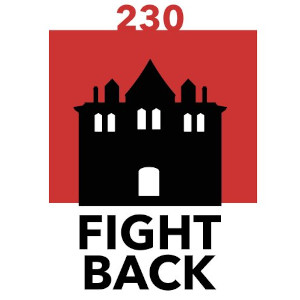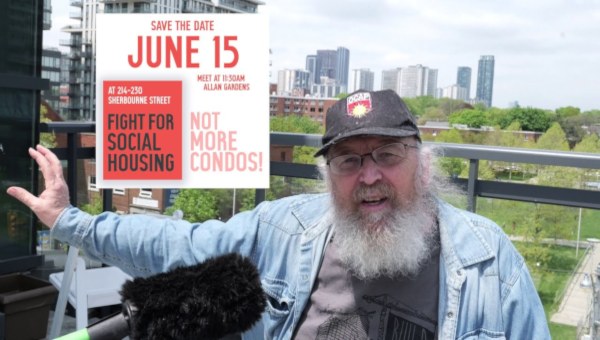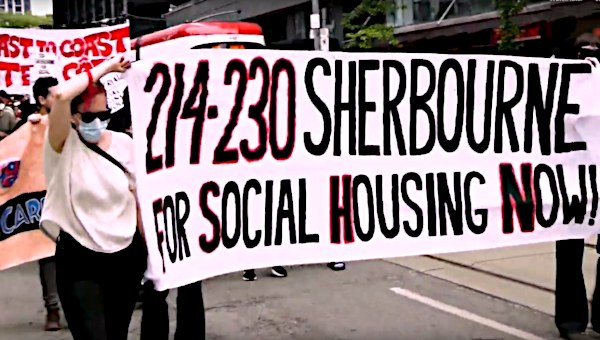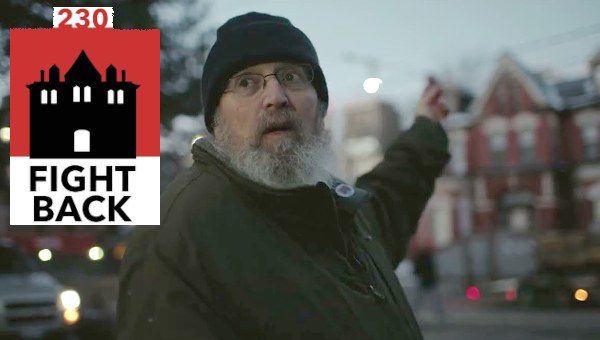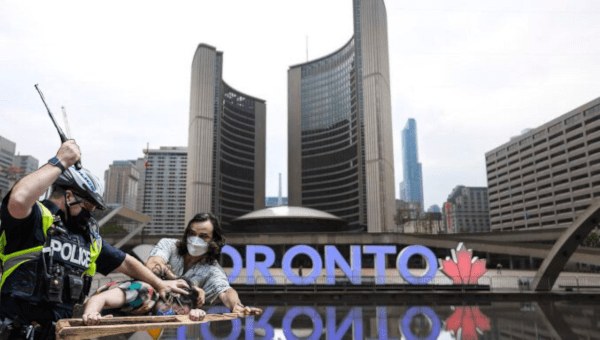Developers Are In Charge Of Toronto’s Housing Policies
Toronto’s communities are being deeply impacted by a terrible lack of decent housing that people can afford to live in. This situation is the product of decades in which governments at every level have allowed housing to be provided according to the profit-driven interests of developers, speculators, investors, bankers and corporate landlords. The days when social housing played a major role in meeting the needs of communities are long gone and upscale redevelopment has done its destructive work.
As a result, homeless shelters are overflowing, people sleep out in public parks and hundreds of thousands of precariously housed tenants stave off eviction by handing over money they need for groceries to their landlords. Politicians sometimes express concern and dismay at this dreadful and needless situation but never challenge the notion that housing should be treated as a commodity, rather than provided as a basic social need and a human right. They surrender to the greed of the developers as an inevitability they dare not oppose.
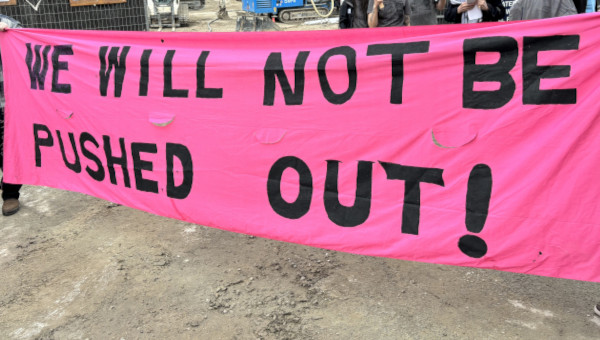
Profits Now
A recent decision by Toronto City Council drives home the degree to which the needs of the developers shapes public policy with regard to housing. The Council hopes to see some 20,000 units of rental housing built and, in order to try and achieve this, it intends to throw incentives at private developers. These “include a deferral of development charges, a property tax reduction and foregone taxes and fees for affordable rental units.”
Mayor Olivia Chow told the CBC that “the city met with builders last week to discuss the plan.” As she put it, “(w)e need to see these rental homes built, and we will work with the industry to make it happen.”
In the first phase of this plan, 7,000 units would be built “which would include 5,600 purpose-built rental homes and at least 1,400 affordable rental homes.” It must be stressed that supposedly ‘affordable’ housing based on market rent criteria is generally unaffordable for low-income people. After the first phase of the plan, everything would depend on whether the provincial and federal governments agreed to participate.
Right-wing councillor Brad Bradford pointed out that developers aren’t satisfied with the quantity of money being thrown at them at this stage and that they “have already said the rules to qualify for the funding are too restrictive.” These champions of ‘free enterprise’ are holding out for a more lavish package because what is on the table so far falls short of their arrogant demands.
Apart from this rather uncertain initiative, the quest for partnerships with developers is all the rage at City Hall. The task of creating rental housing is being placed in the hands of notorious players like KingSett Capital, Greenwin, Tridel, Kilmer-Tricon, Ellis Don, and Windmill through an initiative called ‘Housing Now’ (perhaps better characterized as ‘Profits Now’) that follows a similar script but which, according to Storeys Real Estate News, has had a “sluggish and somewhat haphazard start.”
An approach to housing policy that is based on greasing the wheels for developers’ profit making is by no means confined to the municipal level of government. In 2022, Global News reported that the Ford government’s Bill 23, curtailing of fees that municipalities could charge developers, was raising major concerns. At the time, “(s)everal municipalities (were) planning emergency council meetings to officially criticize the Ford government’s approach and raise questions about how to offset the funds they could lose — often estimated to be in the hundreds of millions of dollars.”
For its part, the Trudeau government clearly believes that the commodification of housing is an unstoppable force it must accept and perpetuate. The National Housing Strategy that it adopted in 2017 was based entirely on this view. Jean Swanson and Sara Sagaii wrote at the time that the initiative might better be called a ‘National Gentrification Strategy’ and they argued against handing money to developers because “(l)ow-income neighbourhoods don’t need expensive condominiums with a few token “affordable” units; they need 100 per cent welfare/pension rate non-market housing that is community controlled. This is the only solution that will lead us out of this housing crisis.”
The decision to turn housing policy over to developers and investors is traceable to the austerity measures taken by federal governments in the 1990s. As Michal Rozworski has explained, these unleashed an “austerity drive (that) was one of the most severe in the Global North, and remains the foundation for the Right’s strategy of death by a thousand cuts.”
As part of this attack, “(t)he federal Liberal governments of the 1990s ended the mission to directly providing public housing, capping funding and offloading responsibilities onto Canada’s provincial governments. The number of new units of social housing built sunk from around twenty thousand in 1993 to under two thousand in 1998.”
With the involvement of the state in housing provision almost completely eliminated, the way was cleared for the rampant agenda of upscale redevelopment that followed. With everything left to the private market, a lack of decent housing, impossibly high rents and an explosion of homelessness were the inevitable results. Governments, especially at the municipal level, were reduced to the role of clearing a path for the developers.
Today, Toronto City Council, including its supposedly progressive members, no longer challenges the greedy behaviour of the developers. It rubber stamps their plans and throws money at them, while, at the very most, haggling over the details. Meanwhile, the unelected City Hall bureaucracy works hand in glove with the developers to ensure their projects and schemes come to fruition with the minimum fuss and delay.
Mayor Olivia Chow and the rest of the ‘left’ on Council fall in line with this approach at every turn. They consider the developers to be an all powerful reality that can’t be challenged. At most, they try to soften the blow a little and pry a few concessions from them that might house a few more low-income tenants.
In the last period, however, the profit bonanza of the developers and financiers has run into some major difficulties. The housing market in Toronto has suffered a serious reverse and the sale of condos has faltered badly. In September, the Financial Post noted that “(t)he sales-to-active listings ratio in the GTA condo market, which measures the balance of supply and demand, is 60 per cent below the long-term average, meaning there was too little demand chasing too much supply.”
Faced with this worrying downturn, it is little wonder that the developers might be ready to consider switching their focus somewhat towards the creation of rental housing, provided enough public funds are handed over to them to make it worth their while. Doubtless, Council will be ready to sweeten the pot somewhat if that’s what it takes. Even as the profit-driven agenda of the developers runs into problems, City Hall is there to help them out.
Alternative Approaches
There are, however, alternative approaches that are being advanced by communities that are impacted by the destructive greed of the developers. When it comes to Council’s proposal to build rental units, Neighbourhood Pods TO (NPTO) has urged that “the $325-million earmarked for developer subsidies be redirected to support Rent-Geared-to-Income (RGI) housing on City-owned land. With this funding, Toronto could subsidize approximately 40,625 RGI units, providing meaningful, long-term affordability to residents. Investing in RGI housing on public land would reduce dependency on market-driven housing, safeguard affordability, and prevent the commodification of housing that often leads to displacement of vulnerable residents. Instead of subsidizing the private sector, Toronto should empower public agencies to directly oversee and manage housing development to ensure that affordability and public benefit remain at the forefront.”
In a statement issued in October, 230 Fightback challenged an impending decision by City Council to shamelessly approve a zoning application by KingSett Capital to build a luxury condo tower and 214-230 Sherbourne, in a poor working class community in desperate need of housing. It called on Mayor Chow to oppose the application and stop “greasing the wheels of the developers’ destructive operations.” It noted that a progressive mayor would “take up a political fight against the power of the developers and fight the commodification of housing that is causing such terrible harm.”
Obviously, no such course of action is going to come from Chow or other ‘progressives’ on Council. Left to their own devices, they will form their odious partnerships with the very business interests that have driven the present housing crisis. They will reject housing policies that are based on community needs, rather than those that boost the developers’ profits and ensure rich returns for investors.
The struggle for social housing and real alternatives is going to have to be taken up by the communities that are under attack in this city. Organizations like 230 Fighback have to continue to press their demands and unite into a city-wide movement that can defeat both the developers and their political enablers in City Hall. •


